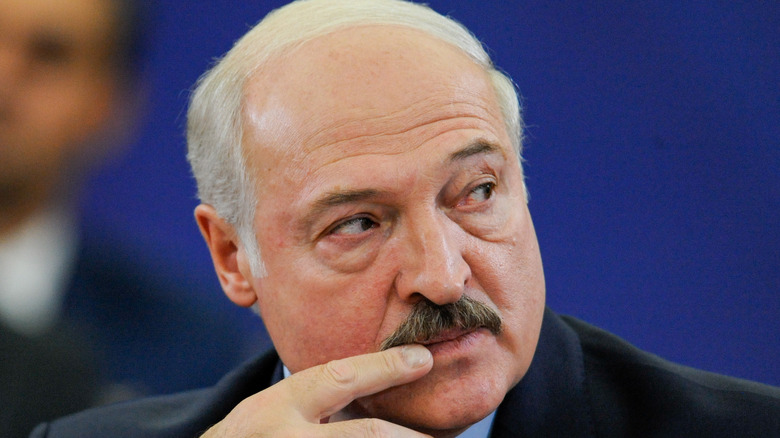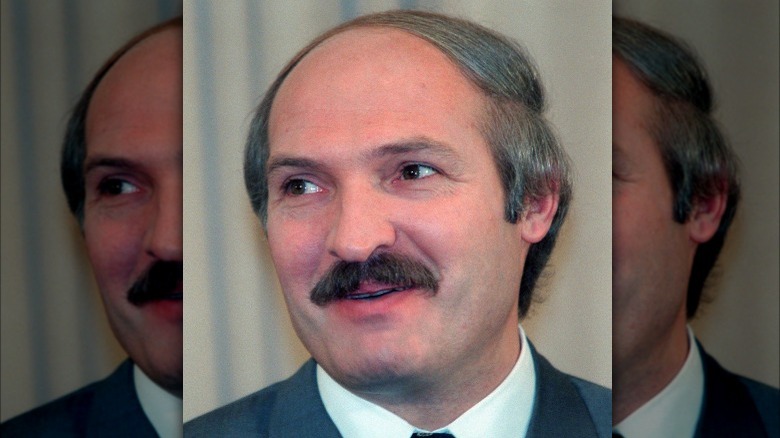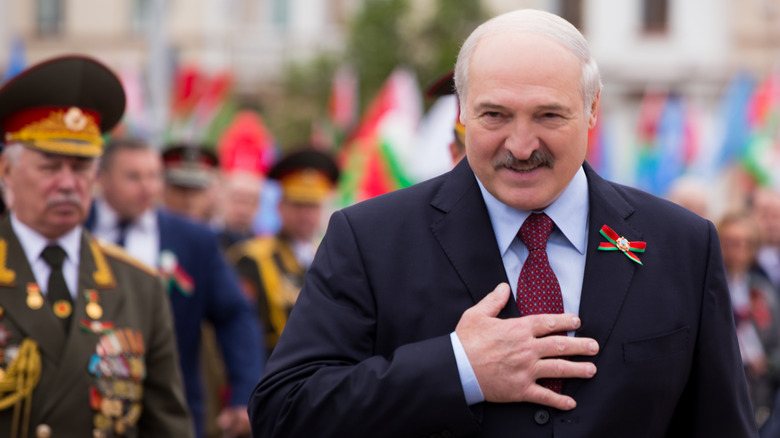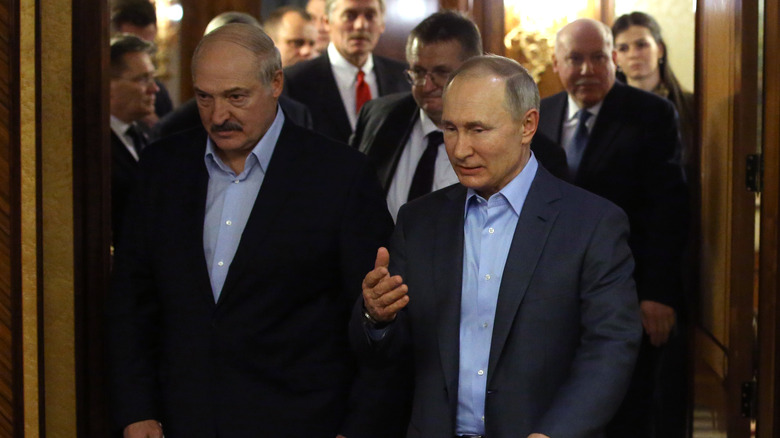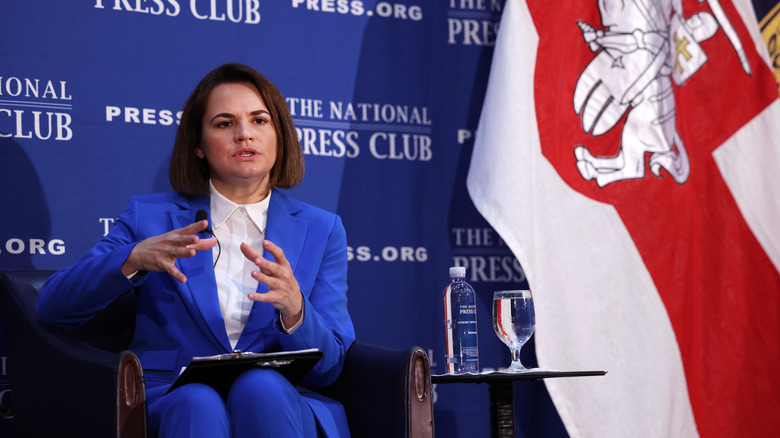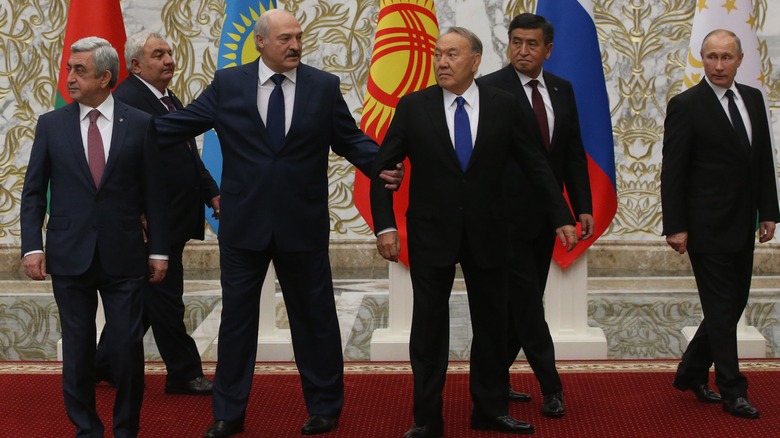Who Is Belarusian President Alexander Lukashenko?
Alexander Lukashenko has been the president of Belarus since the office was created in 1994, after the country broke away from the former Soviet Union (per Britannica). That means he has won six elections for the position, though Western leaders and Lukashenko's opposition have claimed that at least some of those elections were rigged, according to Al Jazeera.
Through years of alleged human rights abuses, Lukashenko has risen a long way since his time as a Soviet collective farm manager. At the time of this writing, the man some had once dubbed "Europe's last dictator" hosted representatives from its neighboring states Ukraine and Russia for diplomatic talks in the wake of Russian president Vladimir Putin's invasion of Ukraine, according to The New York Times. Ukrainian president Volodymyr Zelensky had initially rejected Belarus as the site of the talks because Belarus, ever close with Russia, had allowed Russian troops stationed in its country to join the invasion.
Lukashenko has long been a supporter of a Soviet-style state
Lukashenko was born on August 30, 1954 into the USSR's region of Belarus, then called Belorussia, per Britannica. After graduating from the Mogilyov Teaching Institute and the Belarusian Agricultural Academy, he joined the army, where he spent five years, and later held local posts in the communist party. He managed collective state farms throughout most of the 1980s before he was elected to the Belorusian SSR parliament in 1990, when the Soviet Union was on the brink of collapse.
His affection for the Soviet state was evident even then. When, in 1991, Belarus voted on its exodus from the dying Soviet Union, Lukashenko was the only politician in Belarus to reject the call to break away. When he was elected to the presidency of the new state in 1994, he promised close ties with Russia, according to Al Jazeera.
Lukashenko styled himself as a reformer, but Belarus had been slower to de-communize during the Soviet years of perestroika, and the new president benefited from that fact. He preserved elements of state-run planning, including collective farms and other state-owned businesses, which helped stabilize Belarus's economy during the capitalist "shock therapy" to other former Soviet states that plunged these countries into crisis. And he worked to create former ties with his country and Russia, formalized in the 1999 Treaty on the Creation of a Union State.
He is a self-described authoritarian leader
Where other strongmen leaders might present themselves as men of the people, Lukashenko has often leaned into the strong criticisms of Western leaders. "An authoritarian style of rule is characteristic of me, and I have always admitted it," he said in 2003, according to the BBC. "You need to control the country, and the main thing is not to ruin people's lives." He even called himself a dictator in a 2012 Reuters interview, though he also claimed not to "understand what a dictator is."
Like Putin, Lukashenko has played off the opposition of the United States and the European Union, positioning himself as a man who is unafraid to stand up against the west. "I don't give a damn about what you think of the Belarusian president in the European Union. It wasn't the EU that elected me," he told the BBC network at one point (via Al Jazeera).
The Belarusian elections under Lukashenko have been disputed
Many observers, such as the nonpartisan think tank the Atlantic Council, have called the first election of Lukashenko to the presidency in 1994 the first and last free and fair election in Belarus. There have been five presidential elections since then, though initially the Belarusian constitution only allowed for presidents to seek two terms in office, a limit that Lukashenko abolished in a much-criticized 2004 amendment (per BBC).
It was not the first time Lukashenko had sought extensions to his term limit — in 1996, the country adopted a new constitution that extended his term limits and allowed him the broad ability to set policy without legislative approval, though it also gave him the ability to appoint a third of his parliament's upper house (via Britannica).
In addition to his election in 1994, Lukashenko ran for office in 2001 (per BBC), 2006 (per the Organization for Security and Co-operation in Europe — OSCE), 2010 (per a 2011 OSCE report), 2015 (OSCE in 2016), and 2020 (per OSCE in July of that year). His broad margins of victory in each election, as well as other irregularities, have led independent election watchdogs to declare the results unreliable.
He jailed his opponent and prompted huge protests
By 2020, Lukashenko appeared to many observers as newly vulnerable. He was up against disapproval of his policies surrounding the COVID-19 pandemic, his handling of the economy, and his interference in that year's presidential election, including jailing his opponents, according to Britannica. Even a government-backed poll in April of that year found that only a third of Belarus' population trusted him, a low for his presidency (via Vox).
Svetlana Tikhanovskaya — the wife of one of the opponents that Lukashenko jailed, Sergei Tikhanovsky — managed to run in her husband's stead that year without being jailed, but despite her strong showing in some independent exit polls (one showed her capturing a whopping 80% of the vote), the final tallies showed her receiving 10% against Lukashenko. The result was the largest oppositional protest in Belarus since the fall of the Soviet Union, though Lukashenko did not hold another election and Tikhanovskaya fled to Lithuania (per BBC).
He has hosted talks between Russia and Ukraine before 2022
Belarus shares its longest borders with Russia and Ukraine, and they also share a history of being part of the Soviet Union and tsarist Russia. Because of this, and despite Ukraine's increasing pro-Western bent (and Belarus's longtime pro-Russian stance), Belarus has been used as a "neutral" ground for talks between the two countries. In 2014 and '15 — after a popular uprising removed the pro-Russian president Viktor Yanukovych from office and launched an escalating series of crises between Ukraine and Russia (via Britannica), culminating in the Russian annexation of Crimea — the Belarusian city of Minsk was the site of two diplomatic agreements that led the countries to an uneasy ceasefire (via Al Jazeera).
The agreement, of course, has not appeared to last. And neither has Lukashenko's peacemaker status. In addition to stationing the Russian military, Belarus may soon be the home of Russian nuclear weaponry (via CNN). And the United States has said that they expect Belarusian troops to soon join Russia in invading Ukraine (via Jerusalem Post).
